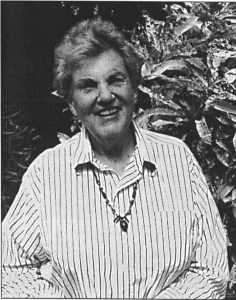Marsue McGinnis McShane

Tsunamis Remembered: Oral Histories of Survivors and Observers in Hawai‘i
Life history interviews with individuals who witnessed and survived tsunamis-particularly the 1946 and 1960 disasters on the Big Island of Hawai'i. Thirty individuals-mostly residents of Hilo and Laupahoehoe-recall their experiences before; during, and after the 1946 and 1960 tsunamis which were arguably the most destructive natural disasters in modem Hawaiian history.
Marsue McGinnis McShane was born May 15, 1924 in Cincinnati, Ohio. Her father, Ralph McGinnis, was a professor of English and journalism at Miami University in Ohio. Her mother, Erma Kl>enig McGinnis, was a homemaker. McShane and an older brother were raised in the college town of Oxford, Ohio. She also spent part of her childhood with her grandmother in nearby Covington, Kentucky. McShane attended schools in Oxford, graduating from high school in 1941. She then attended William Woods College in Missouri for two years before transferring to Miami University and earning her bachelor's of education degree in 1945. Answering a recruiting call from Hawai'i for teachers, McShane arrived at Laupahoehoe School in September of 1945. She taught art and physical education to students from grades seven through twelve. She and three other teachers, Helen Kingseed of Oxford, Ohio, Dorothy Drake of Columbus, Ohio, and Fay Johnson of Roanoke, Virginia, lived in a cottage on the shoreline tip of Laupahoehoe peninsula. This cottage, one of three provided by the school for out-of-town teachers, was located several yards away from the school grounds. On the morning of April 1, 1946, the four young women were awakened by residents who noticed the ocean receding. While the curious women stayed in the area to witness the strange occurrence, a huge wall of water swept them off their feet and into the ocean. Kingseed, Drake, and Johnson were never found, while McShane spent many harrowing hours in the open ocean. She was rescued later in the day by men on a boat. One of the men, Dr. Leabert Fernandez, later became her husband. McShane and Fernandez moved to O'ahu in 1952, where McShane taught at Kailua Elementary School. In 1954, she taught in California at three different schools. She returned to O'ahu in 1956, where she taught English at Punahou School. After leaving teaching to raise a family, she returned to the classroom in 1968 at Kailua Intermediate School. Divorced since 1963, she married John McShane in 1969. She raised three children and two step- children. The oral history interviews were conducted in McShane's Kailua, O'ahu residence.
Scope and Content Note
Raised in Oxford, Ohio, a retired teacher recalls her parents and education, recruitment to teach in Hawaii, and trip to the Islands. She describes her first impressions of Hawaii and settling in at Laupahoehoe School. She talks about students, fellow teachers, classroom, campus, and cottage. McShane recalls April 1, 1946: the tidal wave, cottage's collapse, disappearance of roommates, her near-drowning, thoughts about dying, paddling amidst wreckage, spotting others in the water, and boat rescue by her future husband and two others. She also observes how teaching has changed over time.
Program Note:
This interview is part of the Center for Oral History's project Tsunamis Remembered: Oral Histories of Survivors and Observers in Hawai‘i. Interviews from this project are available in the Center's ScholarSpace open access repository.
The Center for Oral History (COH), in the Department of Ethnic Studies at the University of Hawaiʻi at Mānoa, collects, documents, preserves and highlights the recollections of Native Hawaiians and the multi-ethnic people of Hawaiʻi. It produces oral histories and interpretive historical materials about lifeways, key historic events, social movements and Hawaiʻi’s role in the globalizing world, for the widest possible use.
Please Note: The oral histories in this collection are protected by copyright and have been created for educational, research and personal use as described by the Fair Use Doctrine in the U.S. Copyright law. Please reach out Voices@noaa.gov to let us know how these interviews are being used in your research, project, exhibit, etc. The Voices staff can help provide other useful resources related to your inquiry.
The NOAA mission is to understand and predict changes in climate, weather, oceans, and coasts, to share that knowledge and information with others, and to conserve and manage coastal and marine ecosystems and resources. The Voices Oral History Archives offers public access to a wide range of accounts, including historical materials that are products of their particular times, and may contain offensive language or negative stereotypes.
Voices Oral History Archives does not verify the accuracy of materials submitted to us. The opinions expressed in the interviews are those of the interviewee only. The interviews here have been made available to the public only after the interviewer has confirmed that they have obtained consent.
